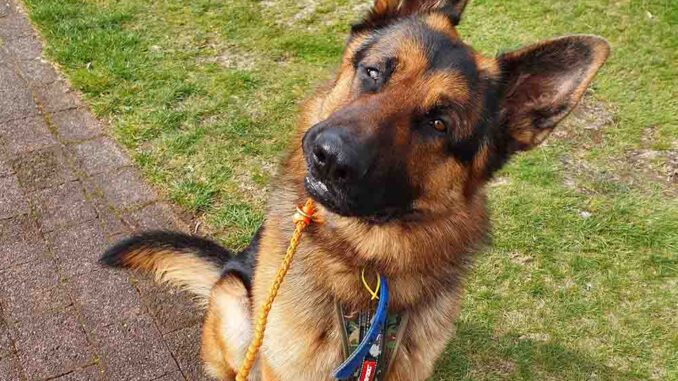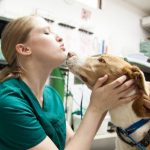
This article was updated on March 31st, 2022
In many cases, vestibular disease resolves itself spontaneously: most dogs will start to improve within 2 to 4 days, with 71% of dogs showing improvements after a median of 4 days after diagnosis according to this study: Vestibular disease in dogs under UK primary veterinary care. The majority of dogs will make a full recovery within 2-6 weeks.
However, it is also fairly frequent for clinical signs to recur or persist the first twelve months after diagnosis. In this article, we will present a few data points about the recurrence of vestibular disease in dogs.
Assuming that the cause of vestibular disease is relatively benign (for example in the case of idiopathic vestibular disease or middle/internal ear infection), time to recovery will typically follow these patterns:
- Symptoms such as a head tilt and incoordination often disappear within the first 1-2 weeks.
- Many dogs will make a full recovery within 2-6 weeks.
Recurrence or Persistence of Clinical Signs with Vestibular Disease
The recurrence or persistence of symptoms can be fairly common: a study of clinical signs and MRI findings in dogs with peripheral vestibular disease found that after a median follow-up time of 12 months:
- Head tilt persisted for 34.5% of dogs.
- Symptoms of facial paresis persisted for 28.5% of dogs.
- Incoordination when moving (ataxia) persisted for 4.1% of dogs.
In total, these neurological deficits persisted in 52% of dogs. 188 dogs were included in the study with a median age of 6.9 years.
Recurrence of vestibular disease was noted in 17.6% of dogs in the first 12 months.
You can learn more about the recurrence of vestibular disease in dogs in our related article about dogs not recovering from vestibular disease:
Related Posts About Vestibular Disease in Dogs:
 Should You Euthanize A Dog With Vestibular Disease? - After 14 years of working as a vet, I can diagnose some client concerns in an instant. When a client… [...]
Should You Euthanize A Dog With Vestibular Disease? - After 14 years of working as a vet, I can diagnose some client concerns in an instant. When a client… [...] Can Vestibular Disease Kill a Dog? - Vestibular disease arises spontaneously, and, often, resolves itself in the same way. For the most part, vestibular disease is a… [...]
Can Vestibular Disease Kill a Dog? - Vestibular disease arises spontaneously, and, often, resolves itself in the same way. For the most part, vestibular disease is a… [...] What to Do if Your Dog Is Not Recovering from Vestibular Disease - Being able to maintain balance is a pretty basic ability, so losing your footing makes life very difficult. The symptoms… [...]
What to Do if Your Dog Is Not Recovering from Vestibular Disease - Being able to maintain balance is a pretty basic ability, so losing your footing makes life very difficult. The symptoms… [...] How to Feed a Dog with Vestibular Disease - If your dog suffers from vestibular disease, you’ll know how much they can struggle to eat. Many dogs with vestibular… [...]
How to Feed a Dog with Vestibular Disease - If your dog suffers from vestibular disease, you’ll know how much they can struggle to eat. Many dogs with vestibular… [...] Dog Vestibular Disease: a Veterinarian Guide for Dog Owners - Old Dog Vestibular Disease can be triggered by a number of things, including inner ear problems, a collar-related injury, a… [...]
Dog Vestibular Disease: a Veterinarian Guide for Dog Owners - Old Dog Vestibular Disease can be triggered by a number of things, including inner ear problems, a collar-related injury, a… [...]Disclaimer: This website's content is not a substitute for veterinary care. Always consult with your veterinarian for healthcare decisions. Read More.





Be the first to comment